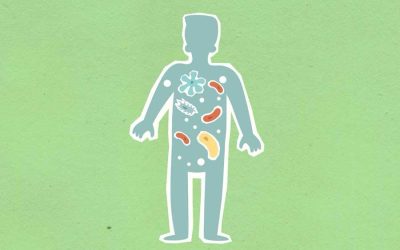Our stress and anxiety levels seem to be at an all-time high. The last few years have been particularly challenging, with a global pandemic, economic uncertainties, and political instability all contributing to a collective sense of unease. According to Mental Health UK, one in ten people live with an anxiety disorder at any given time—over eight million individuals.
Fortunately, the stigma around mental health is lifting, encouraging more people to speak openly about their struggles and seek support for stress and anxiety relief. Understanding what happens in the body when we are stressed and how diet and lifestyle choices can help is a crucial first step to finding peace of mind.
What Happens in the Body When We’re Stressed?
We all experience stress at some point—whether it’s pre-exam nerves or anxiety before a big job interview. However, when these feelings become chronic or overwhelming, they can interfere with daily life.
The Fight-or-Flight Response
When we experience stress, our body initiates a survival mechanism called the ‘fight-or-flight’ response. This reaction, designed to help us escape danger, triggers the release of stress hormones like adrenaline and cortisol. These hormones increase heart rate, sharpen focus, and divert energy from non-essential functions like digestion and immune support.
While this response is helpful in short bursts, chronic stress keeps the body in a heightened state, leading to exhaustion, digestive issues, weakened immunity, and even hormone imbalances. Think of it like driving with your foot constantly on the accelerator. The system will eventually wear out.
The Physical and Mental Impact of Chronic Stress
Studies show chronic stress can be just as bad for mental and physical well-being as smoking, obesity or lack of exercise. ‘Stress Awareness Month’ was launched more than 30 years ago to draw attention to this ‘modern health epidemic.’
Effects of Persistent Stress
Chronic stress has been linked to:
- High blood pressure and cardiovascular problems
- Weakened immune function
- Digestive disturbances such as bloating, IBS, and nausea
- Sleep disorders
- Mood swings, irritability, and difficulty concentrating
- Increased risk of anxiety and depression
What Makes Stress and Anxiety Worse?
Certain diet and lifestyle choices can exacerbate stress and anxiety. While some may provide temporary relief, they often lead to long-term imbalances. Identifying and avoiding these triggers is essential:
Common Triggers of Stress & Anxiety
- Refined and Processed Foods: Diets high in sugar and refined carbs cause blood sugar spikes and crashes, leading to mood swings, irritability, and energy slumps.
- Caffeine Overload: Excess caffeine stimulates the release of more stress hormones, contributing to nervousness, insomnia, and nutrient depletion.
- Emotional Eating: Stress often leads to cravings for comfort foods, but these quick fixes can worsen symptoms over time.
- Alcohol Consumption: While alcohol may provide temporary relief, it disrupts sleep and can increase anxiety long-term.
- Sleep Deprivation: Poor sleep fuels the stress cycle, making it harder to cope with daily challenges.
- Negative News & Social Media: Overexposure to bad news and online negativity can significantly impact mental well-being.
Nutrition and Lifestyle Strategies for Stress and Anxiety Relief
The good news is there is so much we can do to help mitigate the effects of stress through diet and lifestyle choices and build resilience. Don’t forget small changes can lead to big improvements.
Dietary Adjustments for Stress Management
- Easily Digestible Foods: Opt for soups and smoothies, as stress can disrupt gastric secretions, making it harder for the body to break down food and absorb nutrients.
- Balance Blood Sugar: Include protein with every meal to prevent energy crashes. Choose lean meats, legumes, nuts, and seeds.
- Eat Nutrient-Dense Foods: Leafy greens, broccoli, and whole grains provide magnesium and B vitamins, which are essential for stress management.
- Support Gut Health: A healthy gut promotes emotional resilience. Incorporate probiotic-rich foods like kefir, sauerkraut, and kimchi.
- Follow a Mediterranean Diet: Studies show a 35% lower risk of depression in those who follow a Mediterranean-style diet rich in fresh vegetables, healthy fats (olive oil, nuts, avocados), and quality proteins.
- Stay Hydrated: Dehydration can worsen anxiety. Aim for at least 2 litres of water daily.
Key Nutrients to Combat Stress and Anxiety
- Magnesium: Known as ‘nature’s relaxant,’ magnesium helps soothe the nervous system and reduce anxiety.
- Vitamin C: Supports adrenal function and resilience to stress.
- B Vitamins: Essential for nervous system health and energy production.
- Omega-3 Fatty Acids: Help regulate mood and reduce inflammation.
- L-Tryptophan & L-Theanine: Amino acids that help promote relaxation and may improve sleep.
Lifestyle Changes for a Calmer Mind
- Practice Deep Breathing: Engage in diaphragmatic breathing to trigger relaxation.
- Exercise Regularly: Movement releases endorphins, nature’s stress relievers.
- Prioritize Sleep: Aim for 7-9 hours of quality rest each night.
- Incorporate Mindfulness & Meditation: Stay present and reduce overthinking.
- Reduce News & Social Media Exposure: Take breaks to protect your mental space.
- Spend Time in Nature: A simple walk outdoors can significantly boost mood.
- Engage in Creative Activities: Hobbies like painting, music, or journaling can be therapeutic.
- Set a Relaxing Evening Routine: Create a wind-down ritual to signal bedtime.
- Build a Support System: Reach out to friends, family, or professional counsellors for help.
Taking Control of Your Stress & Anxiety
Managing stress is not about eliminating it entirely. That’s impossible, and we simply can’t do that! It’s about building resilience and adopting habits that help you navigate challenges with greater ease. Pick one or two manageable changes to help relieve stress and anxiety and build from there. Whether it’s eating more whole foods, practising mindfulness, or simply prioritising rest, every step counts.




